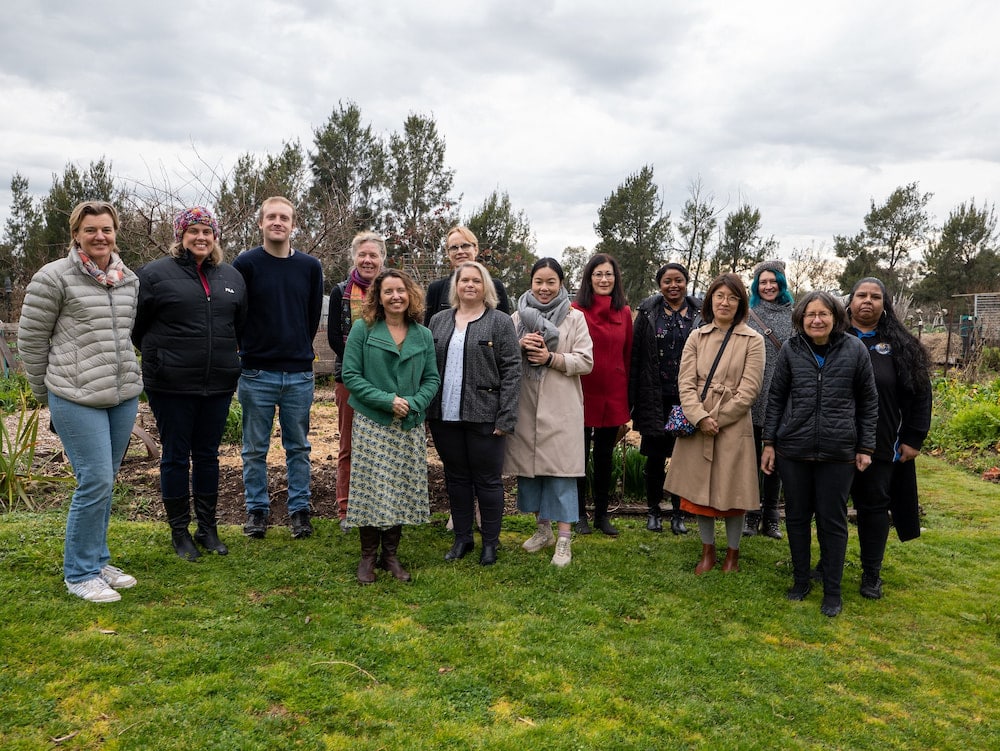The ACT’s Community Garden Grants program will fund nine local projects, including fresh food for Yeddung Mura justice clients and their families, and a little farm to supply and share fresh vegetables to the Belconnen community.
“There is a patchwork of over one hundred community gardens nestled within suburbs throughout our city,” Rebecca Vassarotti, ACT Minister for the Environment, said.
“Community gardens provide a local food source for our community, empower people to learn about gardening, support biodiversity, and help cool our city spaces.
“They also provide focal points where people can come together. The sense of belonging that comes from connecting with people in your neighbourhood can really enhance wellbeing, which is why community gardens are so important.”
The grants program can fund materials to build a new community garden, or to enhance a current garden; equipment hire; tools; or contractor hire.
St Vincent de Paul Society Canberra Goulburn Ltd received $7,140 for their Good Works Garden, a joint initiative between Dirty Janes, Argyle Housing and Vinnies, to create a community garden in the Dirty Jane’s precinct in Fyshwick, run by volunteers and by participants in the charities’ social inclusion and housing programs. The garden will include fencing, sheds, wicking beds, and a compost facility.
The Downer Preschool Parent Association received $2,255 for their Downer Preschool Community Garden Project, set up last year. They have transformed the Preschool’s barren front yard into a sustainable community garden while providing Preschool students with opportunities to learn from and care for the natural environment. They will build small-scale infrastructure to support educational and community-led activities; a yarning circle; and additional vegetable gardens.
YWCA Canberra received $2,228 for the Spence Community Garden, a little farm that will grow fresh fruit, vegetables, and flowers for children and families in Spence and nearby suburbs.
Hawker Community Landcare received $4,308 for Stage 2 of the Hawker Community Garden. They will plant fruit trees, build an additional raised vegetable bed, develop a native garden in the front of the site, and create a bushfood garden. The native garden beautifies a currently barren space and manages urban heat. There will also be education workshops, garden busy bees, planting days, and information about Ngunnawal people’s connection with country and use of local bushfoods.
The Canberra Organic Growers Society Inc (Charnwood) received $1,894 for three raised garden beds. These raised garden beds will be situated near the front gate for easy access, and the heights will be adjustable so less-able-bodied persons can grow organic food.
“Over the past three decades, the Charnwood community have poured their efforts into nurturing our beautiful community garden,” convenor Tessa Rose said. “During that time, we’ve also experienced a changing climate, and in 2020, we received a Community Garden Grant to build a shelter in the garden to provide refuge from increasingly extreme weather events like heat waves and rain events. We’re really pleased with the shelter. It adds to the 45 individual plots, BBQ area, beehives, and a children’s area that make the garden such a welcoming space for our diverse community.”
Yeddung Mura (Goodpathways) Aboriginal Corporation received $7,100 for a Community Reflective Vegetable Garden in Farrer, where they will grow fresh vegetables for Yeddung Mura Aboriginal and Torres Strait Islander Justice Clients and their families, the local Aboriginal elders, the community group, and the general public or Indigenous Communities.
The Council on the Ageing ACT received $7,742 for Towards Zero Waste in Hughes, a facility to reduce and process local waste and grow healthy food at a low cost. The collection and processing of organic waste from the local businesses provides organic compost, lower costs, lower carbon emissions, and creates awareness of local action. It will enhance the Hughes shopping precinct, and could be a model for other suburbs looking for a local/small scale solution to reducing waste and connecting community.
The Margaret Hendry Parents and Citizens Committee Inc. received $6,398 for the Margaret Hendry School Community Garden. The garden will consist of raised beds with an interlocking hexagon design, in keeping with the school’s logo. A section of the garden will be dedicated to indigenous plants to provide knowledge and awareness about this aspect of Indigenous culture.
Holy Spirit Parish, Gungahlin, received $2,079 for their Holy Spirit Community Garden – Sharing Skills to Grow a Sustainable Future. This project will create a community garden accessible to the parish, school, and wider community surrounding Amaroo, and enhance the school vegetable patch to set up a composting program and create wicking beds to grow produce.
“The nine projects that have received a total of $41,145 funding in Round 8 of the Community Garden Grants program will no doubt foster new and continuing friendships, as well as enhance our urban environments for many years to come,” Ms Vassarotti said. “The diversity of projects that have received funding show that there is a huge spectrum of opportunities for Canberrans to get involved.
“The ACT Government is supporting local, small-scale agriculture and gardens to play a small but important part in improving our community resilience to food supply chain shocks resulting from climate change and other global events. These community gardens have an integral role to play as the ACT continues to develop its Food and Fibre Strategy.”



